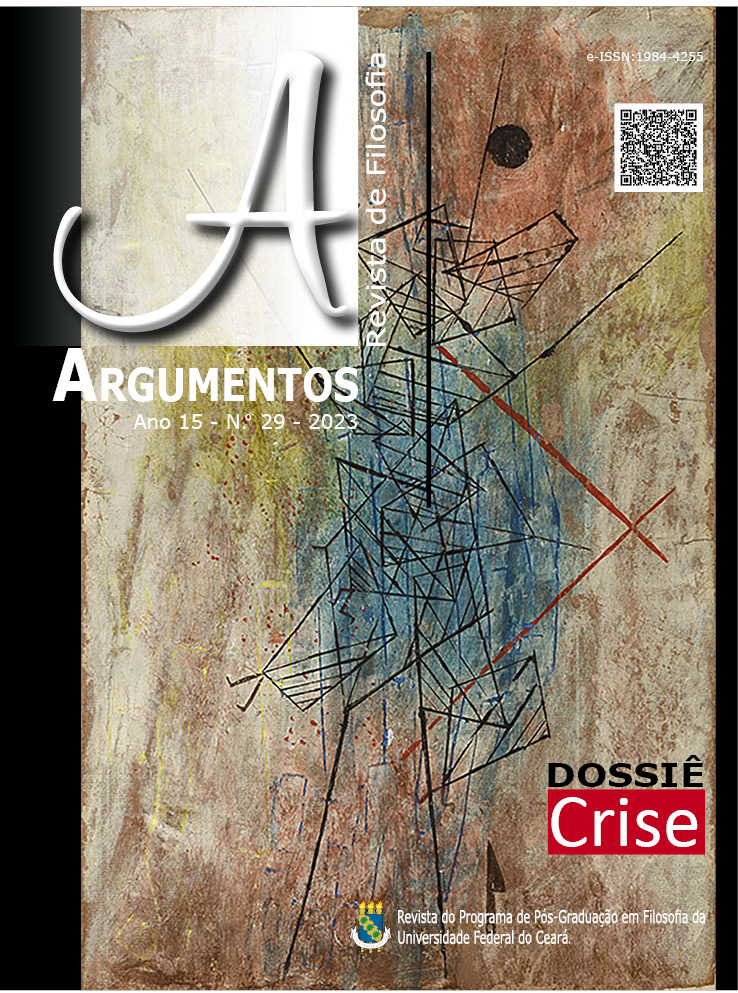O entrelaçamento crítico da história: a historicidade como crise fenomenológica e existencial nas obras de Merleau-Ponty
DOI:
https://doi.org/10.36517/Argumentos.29.2Keywords:
Merleau-Ponty. Historicidade. Crise Existencial.Abstract
As considerações de Merleau-Ponty sobre a historicidade são significativas, tanto como um relato fenomenológico, quanto como um relato existencial de nossa situação histórica. Naturalmente, estes aspectos de seu trabalho não se excluem mutuamente, mas se entrelaçam. E cada aspecto contribui para o sentido da crise da historicidade humana. Primeiro consideraremos a crise fenomenológica da historicidade – ou seja, consideraremos a crise da historicidade fenomenologicamente. Esta é a tentativa de revelar as condições da possibilidade da história a partir da história ou da estrutura de nossa situação histórica – onde a posição de Merleau-Ponty se afasta da fenomenologia husserliana. Em seguida, consideraremos a crise existencial de historicidade – ou seja, consideraremos a crise de historicidade existencialmente. Esta é a tentativa de compreender o imperativo de que as coisas são importantes para nós historicamente. Finalmente, vamos indicar brevemente a importância destes aspectos de nossa historicidade como um entrelaçamento crítico. Este entrelaçamento crítico revela a intrusão mútua do “como” e do “porquê” de nossa historicidade, que Merleau-Ponty descreve no final de sua carreira como uma existência chiasmática dentro da carne do mundo. O cruzamento crítico como interrogatório de nosso ser histórico fornece o “quem”, “o quê”, “quando” e “onde” de nossa historicidade.
References
DAVIS, D. H. “Completing the Existential Recovery of Language”. On: Journal of the British Society for Phenomenology, Vol.21, No.2, May, 1990, pp.175-184.
DAVIS, D. H. “The Art of Revolutionary Praxis: Ghosting a History without Shadows”. In: International Sartre Studies, 27:1, July, 2021, pp.76-98.
DAVIS, D. H. “The Philosopher of Modern Life: Baudelaire, Merleau-Ponty, and the Art of Phenomenological Critique”. In: DAVIS, D. H.; HAMROCK, W. S. (Eds.). Merleau-Ponty and the Art of Perception. State University of New York Press, 2016, pp. 165-185.
DAVIS, D. H. (Eds.). Merleau-Ponty’s Later Thought and its Practical Implications: The Dehiscence of Responsibility, Humanity Books, Prometheus Press, 2001.
EVANS, R. The Coming of the Third Reich, Penguin, 2003
GORDON, L. Fanon and the Crisis of European Man: An Essay on Philosophy and the Human Sciences. Routledge, 1997.
HUSSERL, E. “Philosophy as a Rigorous science”. In: LAUER, Q. (Ed.). Phenomenology and the Crisis of Philosophy. New York: Harper & Row, 1965. pp. 71-148.
MARX, K.; ENGELS, F. Karl Marx und Friedrich Engels: Werke, Band 3, Karl Marx und Friedrich Engels 1845-1846. Berlin: Dietz Verlag, 1953.
MERLEAU-PONTY, M. Le visible et l’invisible [Ed. C. Lefort]. Paris: Gallimard, 1964a.
MERLEAU-PONTY, M. Les aventures de la dialectique. Paris: Gallimard, 1955.
MERLEAU-PONTY, M. “‘Les Fondateurs’ and ‘La Découverte de l'Histoire’: Two Short Pieces Excluded from ‘Everywhere and Nowhere’”. Trans. Duane H. Davies. In: Man and World, Vol.25, No.2 (April 1992), pp.203-209.
MERLEAU-PONTY, M. L’Oeil et l’esprit. Paris: Gallimard, 1964b.
MERLEAU-PONTY, M. Notes de cours 1959-1961 (ed. S. Ménasé]. Paris: Gallimard, 1996.
MERLEAU-PONTY, M. Phénoménologie de la perception. Paris: Gallimard, 1960a.
MERLEAU-PONTY, M. Sens et non-sens. Paris: Gallimard, 1960b.
MERLEAU-PONTY, M. Signes. Paris: Gallimard, 1960c.
MERLEAU-PONTY, M.; ALQUIÉ, F. Les Philosophers Célèbres. Paris: Mazenod, 1956.
Downloads
Published
Issue
Section
License
Argumentos magazine is licensed under an International Creative Commons Attribution License.
The Magazine uses CC BY inclusion
1) The authors retain the copyright granted to the magazine or the right to initial publication, with the work regularly licensed under the Creative Commons Attribution, which allows the sharing of the work with acknowledgment of authorship and initial publication in this magazine.
2) The authors are authorized to contract additional applicable contracts, for non-exclusive distribution of the version of the work published in this journal (for example, publication in the institutional repository or as a chapter of the book), recognition of authorship and initial publication in this journal.
3) Authors are authorized and encourage to publish and distribute their work online (for example, in institutional repositories or on their personal pages) at any time before or during the editorial process, as they can generate productive changes, as well as increase the impact and reference of published work.




.jpg)










._._3.png)
1.jpg)
._._._.png)
